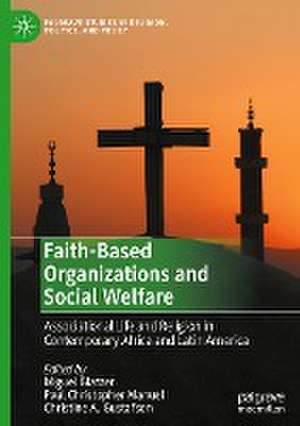Faith-Based Organizations and Social Welfare: Associational Life and Religion in Contemporary Africa and Latin America: Palgrave Studies in Religion, Politics, and Policy
Editat de Miguel Glatzer, Paul Christopher Manuel, Christine A. Gustafsonen Limba Engleză Hardback – 6 feb 2024
Din seria Palgrave Studies in Religion, Politics, and Policy
- 9%
 Preț: 683.50 lei
Preț: 683.50 lei - 15%
 Preț: 637.13 lei
Preț: 637.13 lei -
 Preț: 384.48 lei
Preț: 384.48 lei -
 Preț: 385.62 lei
Preț: 385.62 lei - 15%
 Preț: 640.06 lei
Preț: 640.06 lei -
 Preț: 386.39 lei
Preț: 386.39 lei -
 Preț: 389.70 lei
Preț: 389.70 lei -
 Preț: 396.40 lei
Preț: 396.40 lei -
 Preț: 387.75 lei
Preț: 387.75 lei -
 Preț: 388.72 lei
Preț: 388.72 lei -
 Preț: 389.88 lei
Preț: 389.88 lei - 18%
 Preț: 948.92 lei
Preț: 948.92 lei - 18%
 Preț: 730.79 lei
Preț: 730.79 lei - 18%
 Preț: 730.65 lei
Preț: 730.65 lei - 18%
 Preț: 950.33 lei
Preț: 950.33 lei - 18%
 Preț: 785.74 lei
Preț: 785.74 lei -
 Preț: 415.95 lei
Preț: 415.95 lei - 18%
 Preț: 790.46 lei
Preț: 790.46 lei - 18%
 Preț: 894.03 lei
Preț: 894.03 lei - 15%
 Preț: 638.11 lei
Preț: 638.11 lei -
 Preț: 486.80 lei
Preț: 486.80 lei - 15%
 Preț: 526.83 lei
Preț: 526.83 lei - 18%
 Preț: 779.89 lei
Preț: 779.89 lei - 15%
 Preț: 466.95 lei
Preț: 466.95 lei -
 Preț: 389.49 lei
Preț: 389.49 lei - 18%
 Preț: 726.55 lei
Preț: 726.55 lei - 18%
 Preț: 776.88 lei
Preț: 776.88 lei - 18%
 Preț: 890.85 lei
Preț: 890.85 lei -
 Preț: 396.40 lei
Preț: 396.40 lei - 15%
 Preț: 633.66 lei
Preț: 633.66 lei - 15%
 Preț: 640.37 lei
Preț: 640.37 lei -

-

Preț: 786.52 lei
Preț vechi: 959.18 lei
-18% Nou
Puncte Express: 1180
Preț estimativ în valută:
150.50€ • 157.56$ • 124.53£
150.50€ • 157.56$ • 124.53£
Carte tipărită la comandă
Livrare economică 07-21 aprilie
Preluare comenzi: 021 569.72.76
Specificații
ISBN-13: 9783031319594
ISBN-10: 3031319591
Ilustrații: XXV, 325 p. 23 illus., 19 illus. in color.
Dimensiuni: 148 x 210 mm
Greutate: 0.57 kg
Ediția:1st ed. 2023
Editura: Springer International Publishing
Colecția Palgrave Macmillan
Seria Palgrave Studies in Religion, Politics, and Policy
Locul publicării:Cham, Switzerland
ISBN-10: 3031319591
Ilustrații: XXV, 325 p. 23 illus., 19 illus. in color.
Dimensiuni: 148 x 210 mm
Greutate: 0.57 kg
Ediția:1st ed. 2023
Editura: Springer International Publishing
Colecția Palgrave Macmillan
Seria Palgrave Studies in Religion, Politics, and Policy
Locul publicării:Cham, Switzerland
Cuprins
Part 1: Theoretical Considerations.- Chapter 1. Religion, Faith-Based Organizations and Welfare Delivery in Contemporary Africa and Latin America (Miguel Glatzer, Paul Christopher Manuel, and Christine A. Gustafson).- Chapter 2. The Complex Context for Social Welfare and Human Capacity Strategies in Africa (Katherine Marshall).- Chapter 3.“Africa is not a country”: General Overview of Faith-based Services and Social Welfare in Africa (Nadine Bowers Du Toit and Barnabe Anzuruni Msabah).- Part 2: Societies With a Dominant Religious Marketplace.- Chapter 4. Muslim NGOs in Contemporary Ghana (Holger Weiss).- Chapter 5. Faith-based Organizations and the Challenge of Developmental Social Welfare in Democratic South Africa (Ignatius Swart) .- Chapter 6. Evolutionary Effectiveness of Faith-based Organizations Public Agency in Kenya (Richard Muko Ochanda, and Humphrey Waliang’i Wafula).- Chapter 7. From Prominence to Derision? Chile’s Religious Actors Confront a Turning Point in their Social Welfare Roles (Mathew Carnes and Raimundo Salas Schweikart).- Chapter 8. The Church of the Poor, Civil Society, and Democracy in Southern Mexico: Oaxaca 1960s–2010s (Juan Manuel Lombera).- Part 3: Societies with Mixed Religious Marketplaces.- Chapter 9. Faith-based Organizations, Society, and the State in Chad (Mayke Kaag).- Chapter 10. Faith-based Organizations and Social Welfare: Associational Life and Religion in Nigeria (Omobolaji O. Olarinmoye).- Chapter 11. Faith-based Organizations, Society, and the State in Mozambique (Victoria Armando Chifeche).- Chapter 12. The Contributions of Faith-based Organizations in Uruguay: The most Secularized Sountry in Latin America (Néstor Da Costa).
Notă biografică
Miguel Glatzer is professor of political science at La Salle University in Philadelphia.
Christine A. Gustafson is professor of politics at Saint Anselm College in New Hampshire.
Paul Manuelis a research fellow at the Berkley Center for Religion, Peace, and World Affairs at Georgetown
Christine A. Gustafson is professor of politics at Saint Anselm College in New Hampshire.
Paul Manuelis a research fellow at the Berkley Center for Religion, Peace, and World Affairs at Georgetown
Textul de pe ultima copertă
The case studies in this volume examine the activities of faith-based institutions in a representative sample of African and Latin American countries, including societies with and without a dominant religious tradition, and states with different levels and types of government-provided social services. Among other questions, the chapters examine the types of social service activities faith-based organizations engage in; their effect on civil society and democratic processes; their influence on the character of local and national communities; and what new pressures would be brought to bear on state-provided services if these faith-based organizations ceased to exist.
Miguel Glatzer is professor of political science at La Salle University in Philadelphia.
Christine A. Gustafson is professor of politics at Saint Anselm College in New Hampshire.
Paul Manuel is a research fellow at the Berkley Center for Religion, Peace, and World Affairs at Georgetown
Miguel Glatzer is professor of political science at La Salle University in Philadelphia.
Christine A. Gustafson is professor of politics at Saint Anselm College in New Hampshire.
Paul Manuel is a research fellow at the Berkley Center for Religion, Peace, and World Affairs at Georgetown
Caracteristici
Explores the role that faith-based institutions play in deepening African and Latin American civil society Suggests how faith-based organizations might build social solidarity in Africa and Latin America Of relevance to scholars in political science, sociology, social policy and, perhaps, religious studies
